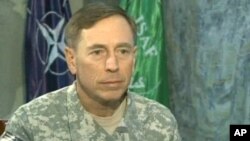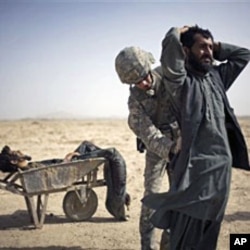The commander of U.S. and NATO forces in Afghanistan says coalition progress in recent months has stopped Taliban advances in most of the country, and is putting pressure on even senior leaders of the group to seek a peace deal with the Afghan government.
General Petraeus has spoken of progress in specific parts of Afghanistan before, but now he says that in the last three-to-six months Afghan troops and his international forces have changed the situation in most of the country.
"I think the Taliban momentum has, as I noted earlier, been reversed in many areas and certainly arrested in the bulk of the country," said Petraeus. "I wouldn't say all parts. There are certainly areas in which they still might have the local initiative. But as a broad characterization I think that the Taliban, again, is feeling enormous pain right now, and that pressure is going to increase."
Petraeus says there is "much hard fighting" still to be done, and U.S. casualties are up sharply this year with the increase in forces and operations in traditional Taliban strongholds, particularly in the south. But the general says many members of the Taliban, including some senior leaders, are seeking reconciliation because of the combination of deadly special operations strikes on the militant group's fighters and field commanders, and increased efforts by the Afghan government and its international partners to improve security and provide development and governance in more parts of the country.
"Most of the mid-level leaders, and even some of the senior leaders, we think, are willing to return to Afghanistan, or might be willing to return to Afghanistan," Petraeus said. "And, frankly, the more pressure that they see on those who are working for them in Afghanistan, the more they feel the desire to come home, because again they are, as you noted, the sons of Afghanistan, and have just been led astray in many cases, not all, but in a number of cases."
Still, General Petraeus cautions that what he calls "various strands of outreach from various Taliban leaders," some inside Afghanistan and some outside, are in the very early stages.
"These can best be characterized as pre-preliminary discussions. There's certainly nothing here that rises to the level of, quote, talks or negotiations. These are exploratory discussions that are taking place," he added.
The general says some form of reconciliation is part of the solution to virtually all insurgencies, and the same will be true in Afghanistan. But he adds the fighters and leaders who want to re-join society must agree to lay down their arms, renounce militancy and violence, and pledge to respect the Afghan constitution and its protection of human rights, as President Hamid Karzai has demanded.
On the role of Afghanistan's neighbors, General Petraeus repeated U.S. government charges that Iran is supporting both the Afghan government and groups trying to overthrow it, including the Taliban.
"Iran does provide, again, what I would characterize as modest amounts of training, equipping, funding and, to some degree, direction to those Taliban elements that are active in the southwest and western part of the country," said Petraeus.
The general called Iran's "conflicting activities" in Afghanistan "somewhat disingenuous at best." And he speculated that the policy must cause some "interesting discussion" among the various leaders in Tehran. He said the Iranians do not want the Taliban to return to power in Afghanistan, but also do not "want see life too easy for the western coalition."
General Petraeus also predicted that he will be able to begin to withdraw U.S. troops and transfer authority to Afghan forces by July of next year, as President Barack Obama ordered when he authorized the deployment of 30,000 additional U.S. troops last December. But the general stressed the pace of the withdrawal will be determined by the security situation at the time.
"It has been much misunderstood, I might add. Certainly the Taliban, [and] others, have seized on July, 2011 and made much more of it than I think is warranted. President Obama and the NATO Secretary General [Anders Fogh Rasmussen], in recent weeks alone, have each stated that they intend to stay in Afghanistan as long as it takes to get the job done. Their quote, not mine."
The July, 2011 date has been much criticized by analysts and some members of the U.S. Congress, who believe it provides encouragement to Taliban fighters and makes it difficult for ordinary Afghans to side with the Kabul government. But General Petraeus told VOA as long as the drawdown is "conditions based" he does not see how anyone can make "an intellectual argument" against it.













